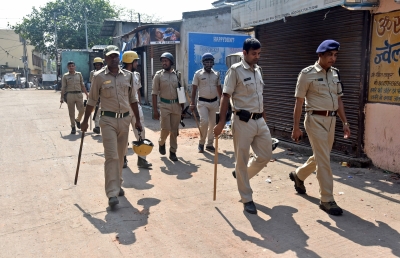By Sumanta Ray ChaudhuriKolkata, April 9 : On April 6, the West Bengal government had to deploy three companies of central armed forces in three mixed population pockets in the state in order to prevent possible clashes over processions during the auspicious occasion of Hanuman Jayanti.
The state government did not take the decision of the deployment of central armed forces voluntarily, rather it was prompted by a clear-cut order from a division bench of the Calcutta High Court asking the administration to do so.
The court gave the order amid clashes over the Ram Navami processions in three districts, which started on March 30 and continued in phases till April 3 night.The court order came amid apprehension that the tension over Ram Navami processions might trickle down to similar incidents on the occasion of Hanuman Jayanti.
In the midst of continuing political slugfest, certain questions are making the rounds in the corridors of power.The first is how unprecedented was the development where the court had to ultimately intervene and give directions to the state administration, instead of the state government voluntarily taking similar steps from the very beginning of the tension on March 30 and preventing the same from escalating and spreading further.
Another question is how long will the court have to give lessons of ‘Rajdharma’ (duty of the ruler) to the state administration.
Senior Trinamool Congress leadership, including Chief Minister Mamata Banerjee and the party’s national General Secretary Abhishek Banerjee, have claimed that the clashes that first broke out at Shibpur in Howrah district on March 30 over a Ram Navami procession took place because the organisers suddenly changed the route of the procession to those pockets which were out of the ambit of the permitted route.
While there are reasons to believe this explanation, even that shows the laxity on the part of the police administration in preventing the route-change attempt at the very beginning.
Senior counsel of the Calcutta High Court, Kaushik Gupta, questioned why and how the police contingent posted on the spot failed to prevent the very first attempt of changing the route.
“Was there absolutely no prior intelligence input about the possibility of a route change? Wasn’t the strength of the police force on the spot not sufficient to prevent the last minute changes? While there might be multiple dimensions of political slugfest over the issue, such questions are bound to arise from a law and order point of view.
“In all probability, such laxities convinced the court that depending only on the state police might not be enough to control possible clashes on the occasion of Hanuman Jayanti and central armed forces need to be deployed to ensure safety on the occasion.Even the division bench of Calcutta High Court raised this question of intelligence failure while hearing the matter,” Gupta added.
In fact, the Chief Minister had also admitted lapses on the part of a section of the police on this count.
On the question of deployment of central forces on the occasion of Hanuman Jayanti following the court order, Calcutta High Court counsel J.P.Khan feels that the observation of the court on the laxity of the administration in case of clashes over Ram Navami processions to a great extent prompted the court order.
“In my opinion, when the first instance of a clash was reported from Shibpur on March 30, the state administration should have called the central armed forces and ordered for their route march in the troubled area.Had it been done, the violence could have been prevented from escalating and continuing till the next day, and even spreading to the Kazipara area in the same district.
“Similarly, when clashes broke out at Rishra in Hooghly district on April 2, the central armed forces should have been called there as well for route march in the area.This could have prevented escalation of the trouble there till the next night, when violent mobs threw stones and crude bombs at trains,” Khan said.
Veterans from the media circles recollected how on December 6, 1992, a prompt decision by then Chief Minister and CPI(M) patriarch, late Jyoti Basu, to call the army saved the state from the bloody aftermath of the Babri Masjid demolition.
Immediately after calling the army, Basu had made a short statement in Doordarshan, saying: “If anyone tries to create riots, I have asked the police commissioner to shoot them on their head.”
That one-liner was enough to send shivers down the spines of the probable mischief-makers, recalled veterans who followed Basu closely then.
src/uk/arm
#central #Hanuman #Jayanti #exposes #Mamata # Mamata Banerjee #Abhishek Banerjee #Darshan #Banerjee #West Bengal #Kolkata #Kolkata #Congress #Trinamool Congress #HanuMan
.






